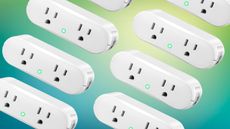10 easy ways to reduce bills, save energy, and live more sustainably
10 ways to reduce bills from style experts that see you cutting the amount of energy you use each month
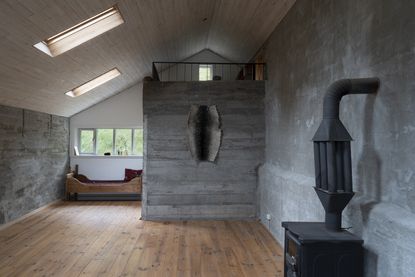
Ways to reduce bills are a modern preoccupation. As power costs rise and houses become more expensive to run, it's natural to want to employ a few tricks to save money where you can.
Plus, saving energy can help you in your quest towards sustainable living. By working out what appliances don't need to be on all the time and making smarter choices about what you buy and how you insulate and care for your home, you can help the environment as well as your wallet.
"Cutting down energy usage has become a core part of modern house design," says Livingetc's editor Pip Rich. "It's a concern that renovators and decorators are now thinking about right at the start of a project. Will purchases be efficient, will they be affordable to run, and will they have longevity? These are key areas that now go hand in hand with decor."
Of course, while it's important to think about ways to save energy when tackling a whole refurb, there are smaller changes you can make to exisiting schemes, too. Some of which are very easy, but can yield big results.
10 ways to reduce bills
1. Don't dust
“Spiders love dust,” says Dr Chris Jardine, technical director of renewable energy installer JoJu Solar. "They also tend to build their webs where it's drafty because more insects will blow in here.” Refrain from dusting duty for a couple of months, then look for the webs - this will be where the cold air is getting in, and where you need to use some sealant around windows. Making sure windows are fully insulated will save you money, whatever type of heating you've chosen.
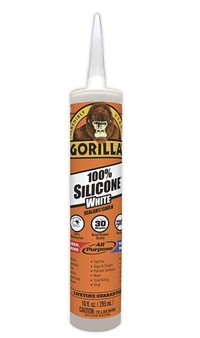
Gorilla 8060002 100% Silicone Sealant, 10 oz | $8.99, Amazon
This white window sealant is easy to use and will make sure your windows stop letting in drafts.
2. Get a Chimney Sheep
“If you’re not using your fireplace, you could be letting in a lot of cold air through your chimney shaft," says Joanna O'Loan of the Energy Saving Trust. A “chimney sheep” is like a big felted umbrella that you put up at the base of the chimney to keep the heat in, she explains, adding a new one to our list of small living room fireplace ideas. You can still use your fireplace - just don’t forget to remove the sheep first.
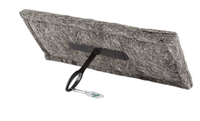
Chimney Sheep | $64.99, Amazon
This chimney flueblocker is easy to install and remove, and there are plenty of sizes available to fit your home.
3. Marie Kondo your energy usage
We get how minimising “stuff” helps us value what’s left - so, "Why not do a Marie Kondo on your energy usage?” asks Chris. Think about how many showers you take, how many miles you drive, how much TV you watch or food you keep - then look at reducing your use so you’re only left with the times that you value it. For example, “If you cut TV-watching to one hour, you’d be really selective, rather than watching mindless eye fodder for hours.”
4. Consider annual consumption

When you buy a new refrigerator, or a car, or a washing machine, you’re setting your energy usage for the next ten years,” Chris explains. Most people know that the A-to-G energy rating scale shows how efficient an appliance is. But efficiency is always relative - for example, a massive, A-rated American fridge will use up more energy than a smaller B-rated one. “Buy appropriate to your needs and compare annual consumption figures instead,” he advises. Perhaps you could consider under-counter refrigeration as part of your small kitchen layout ideas, instead of a whole standalone appliance?
5. Choose radiators wisely

If replacing radiators, you can improve their efficiency by investing in ones with a higher heat output, says Joanna. It’s also a smart move if preparing to install an air source heat pump, says Ian Preston of the Centre for Sustainable Energy, as they need bigger radiators. “Just don’t forget to turn your gas boiler down,” he says (40-50 degrees is enough). Consider also including shelves above your radiators to help the heat tumble back into the room, adds Ian.
6. Monitor your meters
“How often do you check your bank balance?” asks Chris. “Exactly - so why do we not do the same with energy?” Chris recommends taking weekly readings, and then setting yourself tighter budgets: “Any business knows that you can’t change what you're not monitoring.” If you’ve got a smart meter (which have been found to reduce energy use by 5%) and should be part of any automated home, challenge the kids to run round the house to try and turn off the high-use item. “It gives you instant energy literacy,” says Chris.
7. Use a time switch
There are a lot of devices that use a lot of power even when not in use, notes Joanna: many of the best smart speakers, wifi-routers and game consoles, for example. But does anyone ever use them in the middle of the night, and if so, should they be? No! Install a time switch so that they turn off overnight. It might save your sanity too.
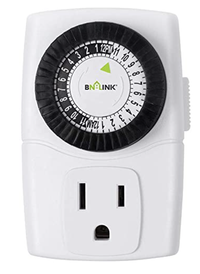
BN-LINK BND-60/U47 Indoor Mini 24-Hour Mechanical Outlet Timer | $13.99 for two, Amazon
This time switch will make sure that smart devices that don't need to be on overnight, won't be.
8. Chat to friends
“Word of mouth is a much more trusted source of information than anything marketed or from the government,” says Chris. He advises talking to your neighbors to increase your energy literacy - what changes have they made, how have they adapted to newer, cleaner types of green energy, and has it reduced their bills?
9. Take responsibility
“A lot of narratives on social media imply that the problem lies elsewhere,” says Chris. He calls this phenomenon “othering” - so, for example, you can “other” to different countries, or to the 100 corporations responsible for 71% of greenhouse-gas emissions, as is doing the rounds. “But as soon as you buy from these corporations or countries, it also becomes your responsibility,” he adds. The fact is that the UK is in the global top 15 for emissions: we all need to take responsibility and learn to how to embrace sustainable choices, from the eco flooring we've used which helps keep the house insulated to the amount of lights we keep on.
10. Defrost you freezer
A frosted-up freezer is less efficient and can cost you an extra $100 a year, Ian points out. Defrost it with a bowl of boiling water so that the steam melts the ice, and try not to overfill your freezer, as the more stuff you put in, the harder it has to work to maintain the temperature. Ian also advises against putting a freezer anywhere near a radiator, as it will just have to cool all that hot air down.
What are 5 ways to save energy at home?
Five easy ways to save energy at home include to defrost your freezer regularly, fix time switches to devices that are on overnight, seal windows properly, plug chimneys to stop drafts and buy a smart meter to help you monitor energy consumption.
Be The First To Know
The Livingetc newsletter is your shortcut to the now and the next in home design. Subscribe today to receive a stunning free 200-page book of the best homes from around the world.
Fleur Britten is a well-respected journalist who for years was the Senior Features Editor at Sunday Times Style. She is known as one of the smartest lifestyle journalists around, revered for being able to decode trends and report on new zeitgeists as they happen. She now writes for the Telegraph, Livingetc, Vogue, The Times, Harper's Bazaar and the Guardian.
-
 What are the Most Comfortable Pillowcases? From Temperature Regulating to the Best for Your Skin
What are the Most Comfortable Pillowcases? From Temperature Regulating to the Best for Your SkinWhen you're looking for comfort in your pillowcases, material matters. These are the best you can buy
By Faaizah Shah Published
-
 5 Simple, but Genius Bathroom Layout Tricks That Will Make Your Space Work so Much Harder
5 Simple, but Genius Bathroom Layout Tricks That Will Make Your Space Work so Much HarderSmall switches to how you lay out your bathroom that help make the most of a small space
By Luke Arthur Wells Published
-
 6 Resolutions to Make Your Smart Home Better in 2024 — This is How to Get More From Your Tech
6 Resolutions to Make Your Smart Home Better in 2024 — This is How to Get More From Your TechMake your smart home work better for you in the new year with these tips to get things firing on all cylinders
By Alan Martin Published
-
 'Okay, That's Genius!' I've Just Discovered This 'Temperature-Controlled' Outlet That has so Many Clever Uses
'Okay, That's Genius!' I've Just Discovered This 'Temperature-Controlled' Outlet That has so Many Clever UsesWith a thermometer built in, these outlets can power devices when the temperature hits a certain point, making them ideal for many use cases
By Alan Martin Published
-
 In your smart TV spying on you? This is what data your TV collects and how can you make it more private
In your smart TV spying on you? This is what data your TV collects and how can you make it more privateInternet-connected smart TVs are designed to make your life easier, but that convenience comes with a price: personal data.
By Alan Martin Published
-
 What is a smart heating system? Explained - the way to save money and the environment, from home
What is a smart heating system? Explained - the way to save money and the environment, from homeA smart heating system could change the way you heat your home to save you money and help nature at the same time.
By Luke Edwards Published
-
 What is human-centric lighting? Meet the smart controls we think every home will have in the future
What is human-centric lighting? Meet the smart controls we think every home will have in the futureHuman-centric lighting systems claim to help boost your wellbeing at home. Here's how they work
By Hugh Metcalf Last updated
-
 What is Netflix spatial audio? Explained: the new sound innovation to improve your next boxset binge
What is Netflix spatial audio? Explained: the new sound innovation to improve your next boxset bingeNetflix spatial audio makes TV and movies more immersive than ever, right in your home and here's how you can enjoy it.
By Luke Edwards Published
-
 Are smart thermostats worth it? How much money can they save?
Are smart thermostats worth it? How much money can they save?Tempted to invest in one of the latest smart heating systems? We ask 'are smart thermostats worth it?' and see if they can reduce your energy bills
By Emily Peck Published
-
 Netflix vs Hulu – which is best? The guide to picking the right streaming platform for you
Netflix vs Hulu – which is best? The guide to picking the right streaming platform for youNetflix and Hulu both have their strengths and weaknesses, but which should you put your dollars behind?
By Alan Martin Last updated



